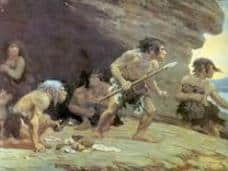In order to know the meaning of the term caveman, it is necessary to discover, first of all, its etymological origin. In this case, we can indicate that it derives from Latin and can be translated as "he who lives in caves." It is the result of the sum of several clearly differentiated components such as these:
-The verb “cavare”, which is synonymous with “dig”.
-“Cola”, which is equivalent to “he who lives”.
The notion of caveman refers to someone who uses a cave as a home or refuge . A cavern, for its part, is a hole that exists underground or between rocks.
 The idea of caveman or caveman is used to name prehistoric human beings or their ancestors who lived in these caves. The concept became a stereotype : a caveman is an ancient man with long hair and a beard, who dresses in animal skins and uses a club to defend and attack.
The idea of caveman or caveman is used to name prehistoric human beings or their ancestors who lived in these caves. The concept became a stereotype : a caveman is an ancient man with long hair and a beard, who dresses in animal skins and uses a club to defend and attack.
Cave paintings are manifestations of cave dwellers that demonstrate their link with caves. These people captured their ideas and beliefs on the walls of the caves with various pigments. Cave paintings, in fact, are a great source of knowledge that allows us, today, to know how cavemen thought and acted.
It is important to note that cave dwellers, in reality, did not live permanently in caves, according to the conclusions reached by various historians. These were individuals who moved constantly and used the caves as temporary shelters or as meeting places.
In the same way, we cannot ignore that one of the plays that has spent the most time on stage in Spain is titled “The Caveman.” Not to mention that it has been in more than 30 countries and has managed to attract more than 8 million viewers.
In Spain, the actor Nancho Novo is in charge of interpreting the monologue of this play, written by Rob Becker, which is a version of life from a man's point of view. Thus, issues such as relationships, male sensitivity, erogenous zones, feminism are addressed...And all of this with a great sense of humor.
It took three years for its author to create this theatrical work and to do so he did not hesitate to study and analyze anthropological, psychological, mythology-related, prehistoric texts...
In the same way, we must not overlook that there is another work titled “The Cavewoman” and which is the “female version” of the previous one. And it is a woman who makes known all the aspects mentioned from her point of view. The authors of it are Vanessa Frost and Emma Peirson.
The notion of caveman, finally, is used as a synonym for retrograde : that is, to refer to subjects who oppose changes and who are against innovations and progress. For example: “My father is a caveman! “He didn't let me go out because he said my blouse was too low-cut,” “There are cavemen who consider homosexuality to be a disease.”
